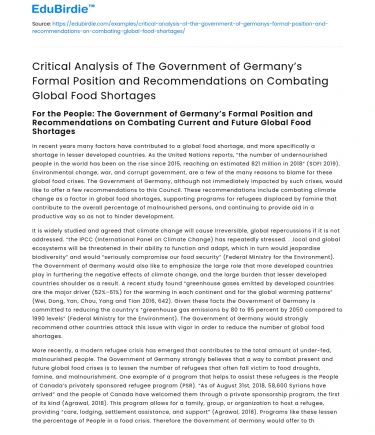For the People: The Government of Germany’s Formal Position and Recommendations on Combating Current and Future Global Food Shortages
In recent years many factors have contributed to a global food shortage, and more specifically a shortage in lesser developed countries. As the United Nations reports, “the number of undernourished people in the world has been on the rise since 2015, reaching an estimated 821 million in 2018” (SOFI 2019). Environmental change, war, and corrupt government, are a few of the many reasons to blame for these global food crises. The Government of Germany, although not immediately impacted by such crises, would like to offer a few recommendations to this Council. These recommendations include combating climate change as a factor in global food shortages, supporting programs for refugees displaced by famine that contribute to the overall percentage of malnourished persons, and continuing to provide aid in a productive way so as not to hinder development.
It is widely studied and agreed that climate change will cause irreversible, global repercussions if it is not addressed. “the IPCC (International Panel on Climate Change) has repeatedly stressed. . .local and global ecosystems will be threatened in their ability to function and adapt, which in turn would jeopardise biodiversity” and would “seriously compromise our food security” (Federal Ministry for the Environment). The Government of Germany would also like to emphasize the large role that more developed countries play in furthering the negative effects of climate change, and the large burden that lesser developed countries shoulder as a result. A recent study found “greenhouse gases emitted by developed countries are the major driver (52%–61%) for the warming in each continent and for the global warming patterns” (Wei, Dong, Yan, Chou, Yang and Tian 2016, 642). Given these facts the Government of Germany is committed to reducing the country’s “greenhouse gas emissions by 80 to 95 percent by 2050 compared to 1990 levels” (Federal Ministry for the Environment). The Government of Germany would strongly recommend other countries attack this issue with vigor in order to reduce the number of global food shortages.
Save your time!
We can take care of your essay
- Proper editing and formatting
- Free revision, title page, and bibliography
- Flexible prices and money-back guarantee
More recently, a modern refugee crisis has emerged that contributes to the total amount of under-fed, malnourished people. The Government of Germany strongly believes that a way to combat present and future global food crises is to lessen the number of refugees that often fall victim to food droughts, famine, and malnourishment. One example of a program that helps to assist these refugees is the People of Canada’s privately sponsored refugee program (PSR). “As of August 31st, 2018, 58,600 Syrians have arrived” and the people of Canada have welcomed them through a private sponsorship program, the first of its kind (Agrawal, 2018). This program allows for a family, group, or organization to host a refugee, providing “care, lodging, settlement assistance, and support” (Agrawal, 2018). Programs like these lessen the percentage of People in a food crisis. Therefore the Government of Germany would offer to this Council that aiding in the global refugee crisis would also aid in combating food crises.
While there are many complicated solutions to a complicated problem, this Council must not abandon the simple solution of monetary international aid. It is important to remember “emergency food aid refashions sovereignty and reshapes politics in ways its proponents and distributors cannot see” (Martinez and Eng 2015, 173). While some international aid may be misplaced and lead to more damage than assistance, when done appropriately it can be incredibly beneficial. In the fiscal year of 2014 the Government of Germany donated 0.42% of its gross national income in aid (OECD 2016, 195). The People of Germany believe that old fashioned foregin aid is one of the best ways to combat current and potential global food shortages, and would like to recommend this solution to this Council.
The current global food shortage and potential global food crises are cause for great, international concern. The Government of Germany would like to reiterate the seriousness of this matter and suggest to the Council three possible solutions: addressing climate change, aiding in the refugee crisis, and monetary aid. While these solutions are only a start, the People of Germany highly recommend the council consider these requests.






 Stuck on your essay?
Stuck on your essay?

